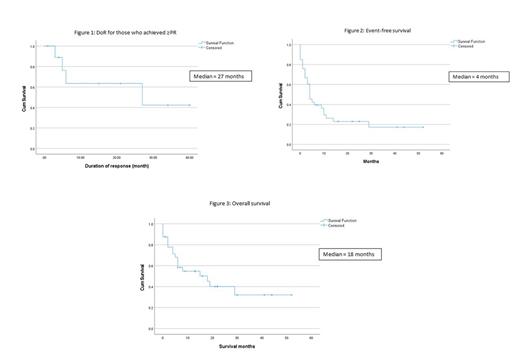Abstract
Introduction:
Gemcitabine, Dexamethasone, and Cisplatin or Carboplatin (GDP/GDCarboP) regimen has comparable efficacy to other salvage therapy in relapsed/refractory (R/R) aggressive lymphoma with successful stem cell mobilisation and bridge to autologous stem cell transplant (ASCT)(Crump et al. 2004). However, half of the patients will not be eligible for ASCT due to inadequate treatment response or co-morbidities. To date, there is little data on the efficacy of Gemcitabine-based salvage regimen in transplant-ineligible patients. Here, we present the real-life data on the outcome of transplant-ineligible patients with R/R NHL and HL treated with salvage GDP/GDCarboP in our centre.
Methods:
We performed a retrospective analysis of patients ≥ 18 years old who had received at least 1 cycle of GDP/GDcarboP with or without Rituximab as second-line or more salvage therapy for R/R non-Hodgkin lymphoma (NHL) and Hodgkin lymphoma (HL) treated between January 2016 to December 2020, with follow-up until 30 June 2021. The median follow-up is 25 months. Patients who subsequently underwent autologous or allogeneic SCT were excluded. Event-free survival (EFS) is defined as time from first dose of GDP/GDCarboP treatment to change of therapy, disease progression or death. Overall survival (OS) is defined as time of first dose of treatment to death from any cause. Duration of response (DoR) is time from the achievement of partial response (PR) or better to disease progression (DP) or death. Rituximab was given for CD20-positive B cell lymphoma patients who had Rituximab treatment-free interval of 12-months or more. Pegfilgrastim was given routinely to all patients on Day 4.
Results:
We identified 33 patients: 61% (n=20) high-grade B-cell lymphoma (HGBCL), 15% (n=5) follicular lymphoma (FL), 18% (n=6) peripheral T-cell lymphoma (PTCL) and 6% (n=2) HL. Majority (64%) of the patients were male. At the start of this treatment, the median age was 71 years (y) (range, 32-84 y), with 64% above 70 y. The median Charlson Comorbidity Index score was 5, with 82% having a score of ≥5. The median prior line of treatment was 2. Eighty-five percent had stage III/IV disease at the time of disease relapse.
The overall response rate was 33% (n=11), comprising PR rate of 18% (n=6) and CR rate of 15% (n=5). The response rates amongst the different lymphoma subtypes were 35% (7/20) HGBCL, 20% (1/5) FL, 17% (1/6) PTCL and 100% (2/2) HL. The median DoR was 27 months (Figure 1). Of those who responded, 3 had disease progression within the year, and 1 died of non-lymphoma cause 27 months after treatment completion. There were 7 deaths (21%) during treatment - 4 from DP, 2 from treatment complications (TC) and 1 from an uncertain cause. Of the remainder, 2 patients (6%) achieved stable disease while 7 (21%) had DP. Seven patients (21%) had subsequent change of therapy due to inadequate response. The overall median EFS was 4.0 months (Figure 2), and the median OS was 18 months (Figure 3). Disease-associated mortality was 42%, whereas treatment-associated mortality was 9%. Dose reduction, dose omission and treatment delay occurred in 55% of patients. During treatment, 73% of patients required red cells or platelets transfusion, while 70% had at least one hospital admission for TC or DP.
Conclusion:
Our real-world data showed that GDP/GDCarboP provides meaningful efficacy and response durability in a third of these difficult-to-treat patients with median 2 prior lines of treatment and who were ineligible for SCT. More than half of these patients had required dose modification, blood transfusion, and hospital admission, indicating the need for good supportive care and close follow-up during treatment, even though this is an outpatient regimen.
Chan: AbbVie: Membership on an entity's Board of Directors or advisory committees; Eusa: Membership on an entity's Board of Directors or advisory committees; GSK: Membership on an entity's Board of Directors or advisory committees; Janssen: Membership on an entity's Board of Directors or advisory committees, Speakers Bureau; Amgen: Other: Travel, Accommodations, Expenses; Celgene: Other: Travel, Accommodations, Expenses; Roche: Speakers Bureau.


This feature is available to Subscribers Only
Sign In or Create an Account Close Modal